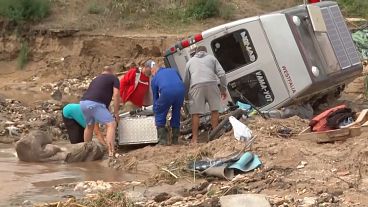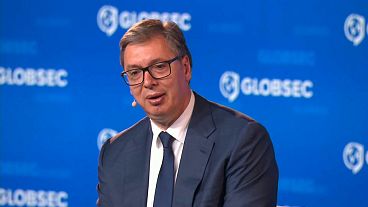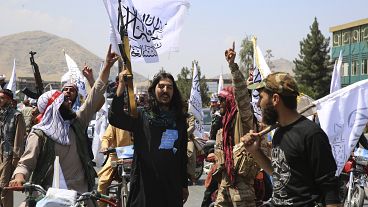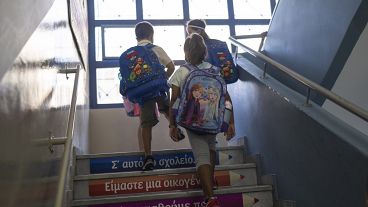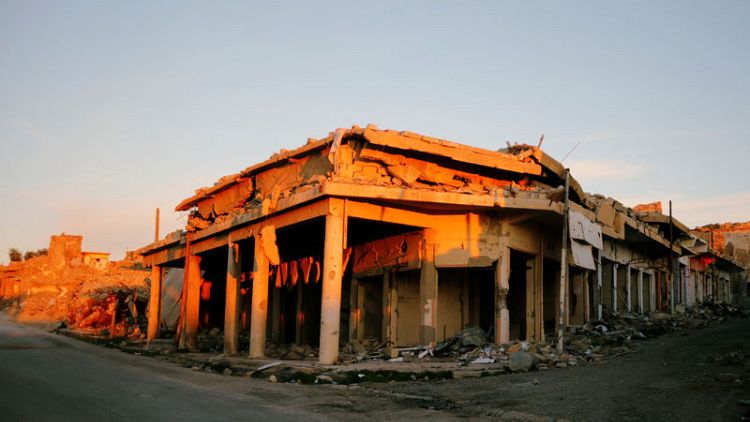By Ayat Basma
SINJAR, Iraq (Reuters) - It's dawn in Sinjar and the only sounds are the footsteps of guards patrolling a golden-domed shrine on a hill overlooking a vista of collapsed rooftops.
More than three years after Islamic State was driven out of this city in northern Iraq, all that remains in the once bustling market are the bomb-scarred facades of shops. Dozens of streets are blocked by metal barrels - a sign of unexploded ordnance that has yet to be cleared.
In a city whose former occupiers slaughtered thousands of minority Yazidis, water is scarce and power intermittent. The closest hospital to reopen is a 45-minute drive away. There are only two schools.
The physical devastation is extreme, but it is not the city's only challenge. Caught in a power tussle between Iraq's central government and the semi-autonomous Kurdistan Regional Government, the city also struggles with a political impasse.
"It is in ruins. There has been no progress at all," said Ibrahim Mahmoud Ezzo, 55, the Yazidi owner of about a dozen shops, all of which are damaged.
"There is no mayor and no local council. People are losing billions of dinars in lost business and property every year, they don't know who to turn to," he said.
"How long are we supposed to wait?"
Overrun by Islamic State in 2014 and liberated by an array of forces the following year, little has been rebuilt and only a fraction of the population has returned. Residents say both the KRG regional government and the central government have made no effort at construction.
Before August 2014 when the jihadists overran it, Sinjar had a population of about 100,000. They included Yazidis, a religious minority whose beliefs combine elements of several ancient Middle Eastern religions and who considered the city the capital of their heartland, as well as Shi'ite and Sunni Muslims, Christians and ethnic Arabs, Kurds, Turkmen and others.
LACK OF RECONCILIATION
Today only a quarter have returned, all of them Yazidi. The Norwegian Refugee Council says none of the members of the other communities have returned because of a lack of reconciliation.
The Yazidis, 3,000 of whom where killed in an onslaught described by the United Nations as genocidal, say nearby Sunni Arab villages and townspeople aided the jihadists.
In the meantime, people are put off returning by tensions arising from the presence of rival armed groups.
Sinjar lies in a sensitive area straddling the borders of Iraq's Kurdistan region and neighbouring Syria, Iran and Turkey.
"The PKK are here, the police are here, the Popular Mobilization Units are here, the army is here," Ezzo said, listing the names of various units of the Iraqi government forces and militias that are in the city and around it.
"We don't understand what the situation is," Ezzo said.
The KRG had controlled the region without much objection from Baghdad since the fall of Saddam Hussein in 2003 until 2017 when, in retaliation for an independence bid, the central government pushed out the KRG, its Peshmerga forces and allies, and brought in their own.
These included a Shi'ite paramilitary force, the Popular Mobilization Units known as PMU, as well as the national army and the police.
At their hilltop post, the PMU guard a shrine with a golden dome that can be seen from many parts of the city. Islamic State had destroyed it along with all other religious landmarks.
The shrine, believed to be the burial site of a daughter of Imam Hussein who died in 680 AD, has been rebuilt entirely, a shining contrast to the devastation around.
NO MONEY TO BUY
Despite the hardship, farmers and villagers from Sinjar still gather daily for a sheep auction. Trader Khodida Qassem lit a cigarette as he watched villagers argue about price.
"What you see here is a lot of sheep but no one has the money to buy," Qassem, 40, said.
Nayef Yazdi, 26, who reopened his store six months ago, says he does not expect things to improve soon. "It is all political," said Yazdi, who lost a brother and two uncles in the fighting in 2014.
Dindar Zebari, the KRG coordinator for international advocacy, said "in Sinjar today, there is no legitimate authority, there are no official and decisive security forces."
"The KRG is not ignoring the problem in Sinjar," he said, urging Baghdad to share responsibility for this area with Peshmerga and ensure the removal of militias including the PMU.
A central government spokesperson could not immediately be reached for comment. Officials privately attribute the slow pace of rebuilding to security problems in the area and red tape in approving a reconstruction budget for Nineveh province.
Outside the city, armed groups appear entrenched. At a cemetery for fighters of the separatist Kurdistan Workers Party, which set up an affiliate to fight IS in 2014 and 2015 and then stayed on, one fighter said the job was not done yet.
"For sure, they (Islamic State) are not gone and we will remain in the mountain to offer help and support and we will go wherever needed," he said, standing beside graves bearing names of the dead from Sinjar and neighbouring Syria, Turkey, and Iran.
Not far away, Yazidi commander Qassem Shesho says he is still prepared to fight. Shesho and his men gave up their arms when the KRG lost control to Baghdad, but they are angry at what he called "threats" by some armed groups he declined to name.
"They are strangers to our land and they want to bring back Daesh under a different name," he said. "God willing they will fail like Daesh."
(Reporting by Ayat Basma and Kawa Omar, Editing by William Maclean)

